Resources
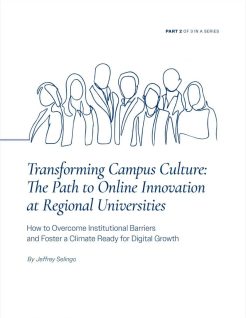
Transforming Campus Culture, Part 2 of 3
The second paper in this three-part series examines how regional universities can overcome institutional barriers and create cultures that embrace online education. The transformation requires more than just implementing technology—it demands a fundamental shift in institutional culture. Drawing from interviews with university leaders and successful case studies, Jeff Selingo presents two complementary models for cultural change that regional universities can adapt to their unique circumstances.
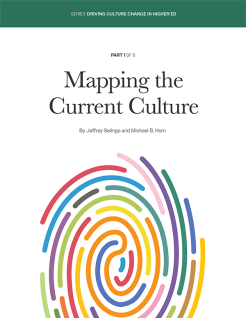
Driving Culture Change in Higher Education
The call for transformation in higher education has never been louder, yet the path forward remains unclear for many institutions. Leaders often struggle with the “how” of meaningful change. This five-part playbook by higher education author and strategist Jeff Selingo as well as other experts draws on proven methodologies to provide clear, actionable guidance from mapping current institutional culture to sustaining long-term momentum.
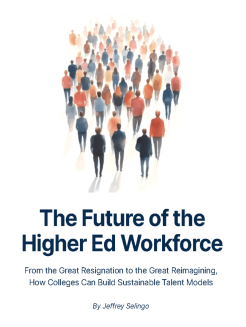
The Future of the Higher Ed Workforce
Higher education institutions can no longer rely on their traditional approach to talent management. With burnout rising, compensation falling behind other sectors, and a wave of retirements approaching, colleges and universities must fundamentally reimagine their workplace models. This report describes three key pillars for building sustainable talent paradigms in higher education and how institutions can transform their cultures, value propositions, and professional development approaches for a new era.
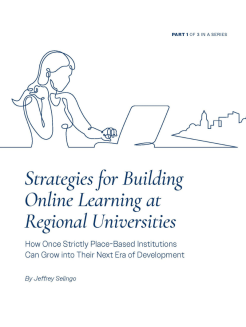
Strategies for Building Online Learning at Regional Universities
Regional universities are finding new opportunities in online education despite the dominance of national institutions. Drawing from institutional data and case studies, Jeff Selingo examines how these place-based schools can leverage their local strengths in the digital space. The paper shows that regional universities hold key advantages through their community connections, affordability, and employer relationships. Through an analysis of successful programs, Selingo demonstrates how regional institutions can grow enrollment by either deepening their focus on adult learners or expanding to serve new non-traditional student populations.
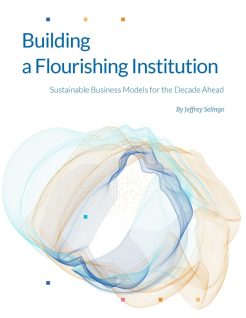
Building a Flourishing Institution
The need to drive swifter execution on current operations while simultaneously developing longer-term strategies has never been more urgent. Those institutions that use the years ahead to advance a more flexible student experience, rethink their offerings to serve new markets of learners, and become more open to experimentation and action, can build momentum for change.
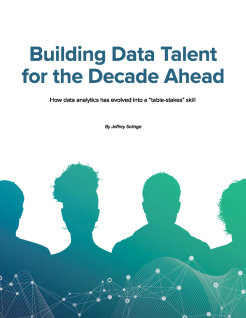
Building Data Talent for the Decade Ahead
The need for employees with data science skills has proliferated — well beyond the tech industry. Those who know how to harness data, structure it, and understand it, will be the most prepared for jobs in many industries. Learn how data science became a new core skill, and four approaches for expanding access to data science education.
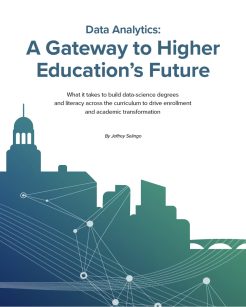
Data Analytics: A Gateway to Higher Education’s Future
Enrollment is the lifeblood of colleges and universities, but the era of organic growth is over. A combination of demography and economics is discouraging a large segment of students from enrolling. The problem is not a lack of learners, but rather a lack of alignment between academic programs and the job market. This paper lays out how data-science degrees and literacy across the curriculum can drive enrollment and academic transformation.
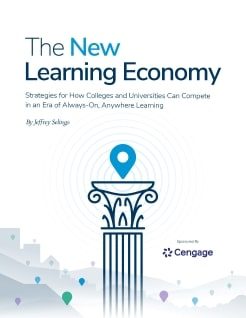
The New Learning Economy
To fulfill a need for always-on, continual education, a New Learning Economy is emerging. While this New Learning Economy won’t replace the traditional system that exists today, in this paper, Jeff Selingo lays out how colleges and universities can embrace the move toward continual education as an opportunity to reach different segments of learners, establish alternative business models, and diversify their revenue streams.
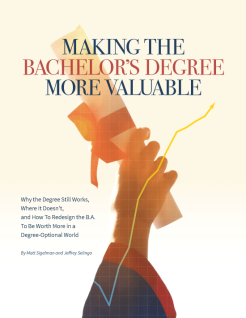
Making the Bachelor’s Degree More Valuable
Employers, including state governments, are dropping degree requirements for their jobs. Combined with the high cost of college, this has increased skepticism about the value of a bachelor’s degree. Using real labor market data, The Burning Glass Institute has researched where the wage premium of a B.A. still exists. Jeff Selingo and Matt Sigelman interpret the data in this new paper to show where the degree still works, where it doesn’t, and how colleges and universities can redesign their B.A. programs to increase ROI.
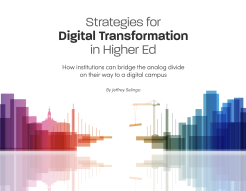
Digital Transformation in Higher Education
Increased digital capabilities hold the promise to modernize every aspect of the student, faculty, and the staff experience. Learn how colleges and universities are approaching digital transformation in this five-part series of papers by higher education author and strategist Jeff Selingo.
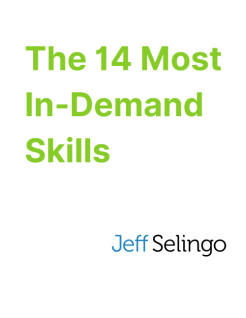
In Demand Job Skills for New College Grads
The Burning Glass Institute, which studies job ads in real time, has identified these foundational skills that are in high demand both for digitally intensive jobs and the wider economy. These skills go beyond the popular conversation around so-called soft skills and 21st century skills to encompass a broader range of business, data, and technical skills that are key to unlocking millions of jobs across domains. While each skill is valuable on its own, students who develop multiple competencies across skill groups earn significantly more and experience increased job mobility and advancement.
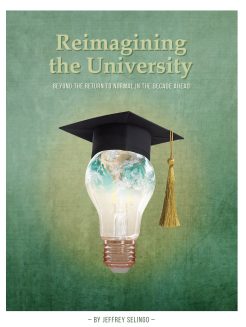
Reimagining the University: Beyond the Return to Normal in the Decade Ahead
Over the past two years, the pandemic has disrupted higher education, forcing institutions to change. Higher education can’t return to its old way of doing business and expect to thrive. Colleges need to transform and distinguish themselves by balancing tradition and stability with innovation and dynamism.
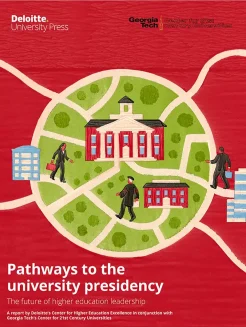
Pathways to the Presidency
The dynamics of higher education in America today are driving the demand for a new set of skills and capabilities for tomorrow’s leaders. Learn how the role of college president is being transformed, the reasons behind these changes, and what the future implications may be for universities.
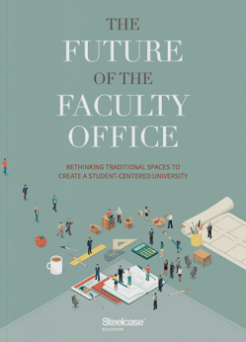
Future of the Faculty Office
Even as the layout and design of the modern workplace is reshaped, with open offices, team huddle rooms, and teleworking, the basic form and function of faculty offices on most college campuses remains much as it has for decades, if not centuries. Walk into almost any academic building —whether it is fifty years old or a year old—and you’ll probably see some version of this: long, narrow hallways lined with doors (often closed) to individual faculty offices.
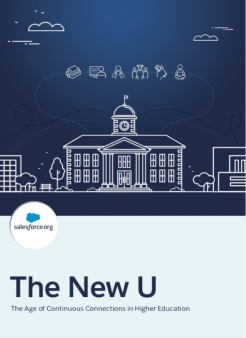
The New U.
How institutions are differentiating themselves with new business models and why creating a technology-enabled, integrated, customized, and continuous experience throughout the learner lifecycle is so critical.

Discussion Guide: Who Gets In and Why
If you’re a teenager, a parent, a high-school counselor, a college admissions officer, or just an interested observer of higher ed, “Who Gets In and Why” tells the story of a year inside college admissions process. To facilitate your discussion of the book in group settings, we’ve put together this discussion guide.

Which Colleges Are Really Buyers and Which Are Sellers
A new way to think about your college list: the Buyers and Sellers.
NEW, updated for 2024.
While cost is a concern, families have only a hazy idea of what their tuition bill might look like. So they don’t think about the price of college until it’s too late.
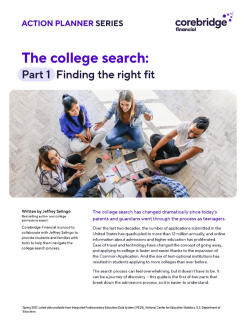
Navigating the College Search
NEW, updated for 2025. To help with your college search, Jeff Selingo has put together a two-part guide, sponsored by Corebridge Financial. This free guide breaks down the “where and why” process by helping to prioritize needs and understand cost—including key terms to know and conversation starters for families. It also dives deeper into the admissions process, what’s most important in applying to college, and ways to determine the true value of a degree.
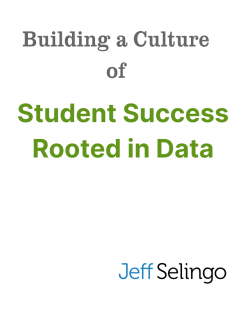
Building a Culture of Student Success Rooted in Data
A benefit of organizing data systems before diving into student success initiatives is aligning the starting point, so that everyone on campus starts with a common set of facts. This case study shows how a college was better able to understand and celebrate progress on metrics. This approach also helps maintain focus when daily demands compete with work on longer term priorities.
Don't Miss a Thing!
Get instant access to Jeff’s higher ed resources and get his periodic newsletter, packed with his latest reporting on colleges and universities.
Sample Issues
of Next Newsletter
“One of the most coolheaded examinations of the admissions process that I’ve read.”